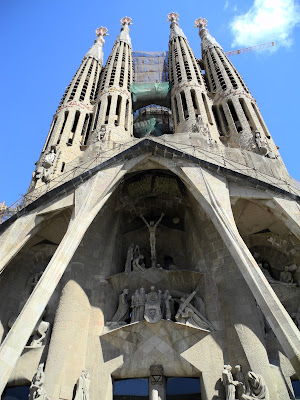I wrote recently about travelling to Barcelona earlier this year and experiencing the fascinating interior of the Casa Battlo. What really blew me away, though, was Gaudi's unfinished masterpiece, La Sagrada Familia. Construction started on The Holy Family Cathedral in 1882, and completion is estimated for 2028, at the earliest. Why has it taken so long? Gaudi is said to have remarked, "My client is not in a hurry."
Following Gaudi's death in 1926 (he died after being hit by a tram at the age of 73), several other architects and their teams have continued work on the cathedral. To some extent this has been educated guesswork on what Gaudi's original intentions were, since many of the original plans and models were destroyed during the devastating Spanish civil war of the 1930s. The remaining models reveal Gaudi's remarkable way of translating intuitive forms into architectural realities. The architect reportedly disliked working from complex mathematical formuals, and so he devised intricate models to evaluate the weight-bearing capacity of his designs. The model below shows the hyperbolic curves of the nave ceiling upside down, with the load each curve will bear hanging as a proportionate weight below. Beneath the model is a mirror, reflecting the ceiling right side up.
The original design of the cathedral used traditional Gothic parabolic curves to connect the pillars to the ceiling, which evolved through a series of models into the final plan: a forest of unprecedented hyperbolic curves branching out like a canopy atop richly hued marble pillars in shades of natural pinks, greys and white.
The exterior is highly symbolic, and ornamented with abandon. Contrasting sharply with the muted, abstracted serenity of the interior, from the outside the building is astonishingly gaudy, and overtly metaphorical in its representational imagery. The cathedral has three representational facades and will have 18 spires, representing the twelve apostles, the four evangelists, Mary and Jesus. When completed, the spires will make La Sagrada Familia the tallest church in the world. Eight spires have been completed so far, and feature strange and heavily ornate symbols decorated in brightly coloured mosaics: snails and frogs, and fruit.
Two of the facades are complete: the passion facade, depicting Christ's death through angular, emaciated figures; and the nativity facade, decorated with such a heaving mass of carved figures of humans and animals that from afar it appears to be covered in barnacles. The unfinished glory facade will contain representations of the seven deadly sins and the seven heavenly virtues, along with prayers written in a number of languages in boldly coloured mosaics.
The cathedral was consecrated as a basilica by Pope Benedict XVI in 2010, and is a UNESCO World Heritage site.
La Sagrada Familia, still under construction after 130 years
A string model of the cathedral's hyperbolic ceilings hangs upside down to determine weight-bearing capacity
Architects use 3D printed models to extrapolate plans from what remains of Gaudi's original designs
Three models show the progression of the structure from parabolic curves to lightweight hyperbolic arches
Stepping into the cathedral's enormous interior is a sublime experience: there is an airiness and warmth to the botanically derived forms, and yet the solidity and reverence of medieval cathedrals also permeates the space. The stained glass windows are free from representational images, instead vividly suggesting notions of grace, faith and awe through abstracted shapes and colour combinations.
Grand pillars branch out in a canopy of hyperbolic arches
The hyperbolic arches result in unusual chimneys into the ceiling
The stained glass windows use blocks of colour rather than representational depictions to evoke spirituality
The exterior is densely populated with unusual gargoyles
Two of the facades are complete: the passion facade, depicting Christ's death through angular, emaciated figures; and the nativity facade, decorated with such a heaving mass of carved figures of humans and animals that from afar it appears to be covered in barnacles. The unfinished glory facade will contain representations of the seven deadly sins and the seven heavenly virtues, along with prayers written in a number of languages in boldly coloured mosaics.
The Passion Facade
The Nativity Facade
The cathedral was consecrated as a basilica by Pope Benedict XVI in 2010, and is a UNESCO World Heritage site.













No comments:
Post a Comment